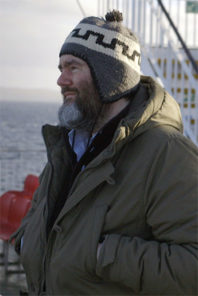
“Meanings change,” Aidan Moffat says through a voice over, and so do intentions. The ex-lead singer of the Britpop band Arab Strap recorded a concept album full of folk songs with ‘modern’ lyrics. It has the same title as this documentary and, as he confessed, he did for a laugh. Moffat toured small towns in Scotland. This tour happened in 2014 when he met politely indifferent pub crowds. Some showed skepticism towards a man who’s ‘disgracing’ their traditions. Or is trying to fuse two puzzle pieces that don’t fit. However, these people’s opinion dwarfs in comparison to folk singer Sheila Stewart’s. His ‘fun’ project turns into a way to impress her, thinking she’d be understanding of his intentions. There’s a scene early in the movie where he tries out his new words for her.
This is after she explains a song’s context. It does not go well for Moffat in that cringe worthy scene. Thankfully, the has just the right amount of cringe without going overboard. Stewart becomes his most vocal critic. The documentary focuses on her and Moffat as worthy intellectual adversaries. However, it also shows how both are coming from the same place. Both see the universality of the songs’ themes, including alcoholism and the temporary nature of communities. They’re both aliens in their land. She belongs to a past civilization while he realizes that his own country resists the problems of modernity. Their opinions, therefore, manifest in different forms. She doesn’t see the need for changing the songs. She says they’re good enough for her forebears and for him. Meanwhile he discusses his ambivalence towards their history.
The differences between Moffat and Stewart are many, the city boy versus the country woman. There are also gender and generational divides between them. He is a strong defender of the now, saying things like folk songs needing an editor. That’s despite professing a love for them that comes off as authentic. He sometimes turning himself into a bumbling protagonist. I’ve previously complained about this kind of subject in another doc. But most of the time, it shows his vulnerability of an artist who has faced criticism throughout his career. Also, his narration, easily one of the film’s best elements, turn into prayers to a person he considers a friend. He calls out to a person signifying Scotland’s disappearing history. And there’s a poetry in his narration that’s just natural to him.
- Release Date: 1/20/2018


